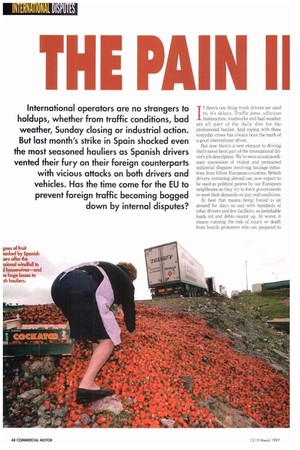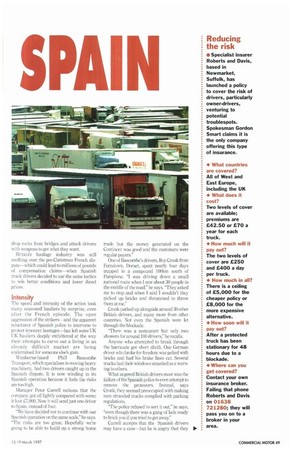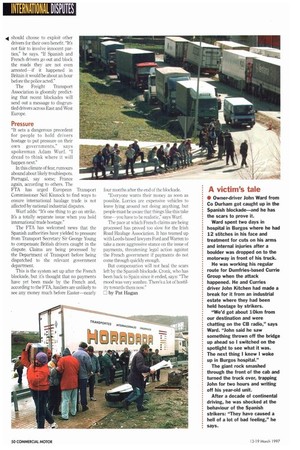TN PAI N S P AIN
Page 60

Page 61

Page 62

If you've noticed an error in this article please click here to report it so we can fix it.
International operators are no strangers to holdups, whether from traffic conditions, bad weather, Sunday closing or industrial action. But last month's strike in Spain shocked even the most seasoned hauliers as Spanish drivers vented their fury on their foreign counterparts with vicious attacks on both drivers and vehicles. Has the time come for the EU to prevent foreign traffic becoming bogged down by internal disputes?
If there's one thing truck drivers are used to, it's delays. Traffic jams, officious bureaucrats, roadworks and bad weather are all part of the daily diet for the professional haulier. And coping with these everyday crises has always been the mark of a good international driver.
But now there's a new element to driving that's never been part of the international driver's job description. We've seen an extraordinary succession of violent and protracted industrial disputes involving haulage industries from fellow European countries. British drivers venturing abroad can now expect to be used as political pawns by our European neighbours as they try to force governments to meet their demands on pay and conditions.
At best that means being forced to sit around for days on end with hundreds of other drivers and few facilities, as perishable loads rot and debts mount up. At worst, it means running the risk of injury or death from hostile protesters who are prepared to drop rocks from bridges and attack drivers with weapons to get what they want.
Britain's haulage industry was still seething over the pre-Christmas French dispute—which could lead to millions of pounds of compensation claims—when Spanish truck drivers decided to use the same tactics to win better conditions and lower diesel prices.
Intensily
The speed and intensity of the action took many seasoned hauliers by surprise, even after the French episode. The open aggression of the strikers—and the apparent reluctance of Spanish police to intervene to protect innocent hostages—has left some UK UK hauliers deeply embittered at the way their attempts to carve out a living in an already difficult market are being undermined for someone else's gain.
Wimborne-basal Phill Bascombe Transport, which specialises in moving heavy machinery, had two drivers caught up in the Spanish dispute, It is now winding in its Spanish operation because it feels the risks are too high.
Manager Peter Currell reckons that the company got off lightly compared with some; it lost £7,000. Now it will send just one driver to Spain, instead of four.
"We have decided not to continue with our Spanish operation on the same scale," he says. The risks are too great. Hopefully we're going to be able to build up a strong home trade but the money generated on the Continent was good and the customers were regular payers."
One of Bascombe's drivers, Roy Cronk from Ferndown, Dorset, spent nearly four days trapped in a compound 100km south of Pamplona. "I was driving down a small national route when I saw about 30 people in the middle of the road," he says. "They asked me to stop and when I said I wouldn't they picked up bricks and threatened to throw them at me."
Cronk parked up alongside around 30 other British drivers, and many more from other countries. Not even the Spanish were let through the blockade.
"There was a restaurant but only two showers for around 1(X) drivers," he recalls.
Anyone who attempted to break through the barricade got short shrift. One German driver who broke for freedom was pelted with bricks and had his brake lines cut. Several trucks had their windows smashed as a warning to others.
What angered British drivers most was the failure of the Spanish police to even attempt to remove the protesters, Instead, says Cronk, they seemed preoccupied with making sure stranded trucks complied with parking regulations.
"The police refused to sort it out," he says, "even though there was a gang of lads ready to brick you if you tried to get away."
Curren accepts that the Spanish drivers may have a case—hut he is angry that they ■ should choose to exploit other drivers for their own benefit. "It's not fair to involve innocent parties," he says. "If Spanish and French drivers go out and block the roads they are not even arrested—if it happened in Britain it would be about an hour before the police acted."
The Freight Transport Association is gloomily predicting that recent blockades will send out a message to disgruntled drivers across East and West Europe.
Pressure
"It sets a dangerous precedent for people to hold drivers hostage to put pressure on their own governments," says spokesman Adam Wurf. "I dread to think where it will happen next."
In this climate of fear, rumours abound about likely troublespots. Portugal, say some; France again, according to others. The FTA has urged European Transport Commissioner Neil Kinnock to find ways to ensure international haulage trade is not affected by national industrial disputes.
Wurf adds: "It's one thing to go on strike. It's a totally separate issue when you hold international trade hostage."
The ETA has welcomed news that the Spanish authorities have yielded to pressure from Transport Secretary Sir George Young to compensate British drivers caught in the dispute. Claims are being processed by the Department of Transport before being dispatched to the relevant government department.
This is the system set up after the French blockade, but it's thought that no payments have yet been made by the French and, according to the FrA, hauliers are unlikely to see any money much before Easter—nearly four months after the end of the blockade.
"Everyone wants their money as soon as possible. Lorries are expensive vehicles to leave lying around not doing anything, but people must be aware that things like this take time—you have to be realistic," says Wurf.
The pace at which French claims are being processed has proved too slow for the Irish Road Haulage Association, It has teamed up with Leeds-based lawyers Ford and Warren to take a more aggressive stance on the issue of payments, threatening legal action against the French government if payments do not come through quickly enough.
But compensation will not heal the scars left by the Spanish blockade. Crank, who has been back to Spain since it ended, says: "The mood was very sombre. There's a lot of hostility towards them now."
El by Pat Hagan
























































































































